Oct 3, 2022
Hungary Strikes Deal With Gazprom as Gas Bill Threatens Economy
, Bloomberg News

(Bloomberg) -- Russian energy giant Gazprom PJSC will allow Hungary to delay payments for natural gas if necessary, as soaring imports threaten to upend the country’s already strained budget.
Hungary has won a three-year delay on gas bills coming due in the next six months, the Economic Development Ministry said in a statement on Monday. At 300 euros ($292) per megawatt-hour, that would amount to 3.5 billion euros to 4.5 billion euros, the ministry said. The agreement is between Gazprom and Hungary’s state-owned energy company MVM Zrt.
Soaring energy payments are aggravating concerns about the state of Hungary’s economy. Billions of euros in European Union funding are locked over concerns about corruption under Prime Minister Viktor Orban, international reserves are below the level needed to cover at least three months of imports and the forint is trading at all-time low despite the EU’s highest key interest rate, partly due to Hungary’s reliance on imported Russian gas.
“The forint is getting a protective umbrella with this deal,” Economic Development Minister Marton Nagy said by phone. “It may help stabilize the forint because payments will come due three years later.”
Hungary is one of the EU nations most reliant on Russian energy, and has seen the cost of oil and gas imports soar to an estimated $19 billion this year from $4 billion in 2019, according to government data. Gazprom didn’t immediately respond to a request to comment.
Additional purchases of natural gas from Gazprom, on top Hungary’s long-term contract, will cost the budget an extra 740 billion forint ($1.7 billion) this year and widen the budget deficit to 6.1% of gross domestic product from a targeted 4.9%, Finance Minister Mihaly Varga said on Sept. 23.
The forint fell 4% against the euro in the past week to a record low. That took its year-to-date loss to more than 13%, the third-worst in emerging markets.
Separately, the government said it had decided to deplete 800 million cubic meters of so-called cushion gas from a storage facility in the eastern city of Hajduszoboszlo, a volume currently valued at 1.5 billion euros.
(Updates with details of agreement, minister’s comment from second paragraph)
©2022 Bloomberg L.P.







